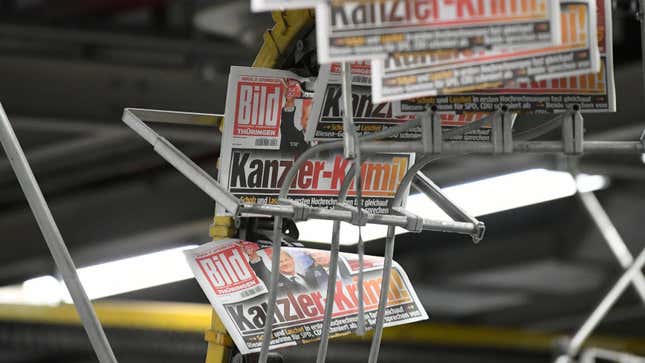
A wave of job cuts hitting German tabloid Bild, Europe’s best-selling newspaper, are just a taste of what’s to come as even print publications prioritize digital media and embrace artificial intelligence.
In a memo to staff first reported by German newspaper Frankfurter Allgemeine on June 19, Bild’s parent company, Axel Springer, shared plans for a reorganization that will involve the loss of some 200 roles. Bild, which currently employs about 1,000 people, will discontinue the publishing of six of its 18 regional editions, and close two-thirds of its regional offices.
The memo, also quoted by CNN, noted that journalists whose roles can be performed by AI will be the first in future firing lines. “[We are] starting a clear AI offensive because we also need that for our move to digital-only...AI will soon be able to completely take over the layout of the printed newspaper.” Staff roles that will be affected include those of editor-in-chief, sub-editors, photo editors, because these jobs “no longer exist as they do today.”
The allure of ChatGPT
Berlin-based Axel Springer is one of Europe’s largest media companies and also owns US-based titles like Politico and Insider. Axel Springer CEO Mathias Döpfner said in a February memo to staff that the goal is to transition into a “purely digital media company,” and give AI tools such as ChatGPT the opportunity to “make independent journalism better than it ever was – or replace it.”
A Bild spokesperson told the Guardian that exploring the use of AI in the newsroom will “make journalism better and maintain independent journalism in the long term.”
The limitations of AI in the newsroom are enormous
ChatGPT is trained on trillions of data parameters to make its answers more accurate and human-like, but the chatbot’s ability to generate balanced reporting remains largely untested. Some ChatGPT users raised concerns about political bias when, in February, the chatbot reportedly refused to generate a poem about former US president Donald Trump, claiming it would be inappropriate to create content that glorifies an individual, but wrote one about current US president Joe Biden.
The bot has also been widely criticized for its lack of emotional intelligence, failure to understand different contexts, lack of accuracy, limitation to detect typos, and its inability to generating long-form, structured content needed in in-depth news reporting and investigations.
Despite recent advances in their capabilities, generative AI chatbots still struggle to write articles with specific tones, such as humor, and lack the capability to produce original reviews of gadgets, software, books, movies or music like reporters do. Generative AI chatbots also tend to publish plagiarized content and repurposed content without credit, and threaten to create an explosion of misinformation and misleading content.
“I’m optimistic about this as a technology for us, with the big caveat that the technology poses huge risks for journalism when it comes to verifying content authenticity,” said Chris Berend, the head of digital at NBC News Group, during an April Semafor conference in New York.